Stephen Roney's Blog, page 226
August 23, 2020
Conservative Leadership--Last Minute Prediction
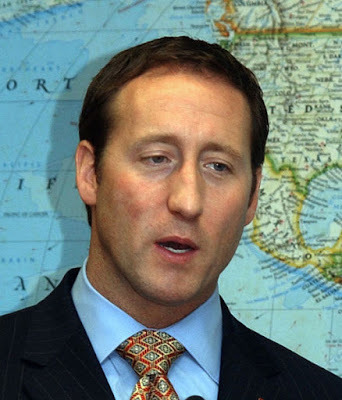 The Favourite.
The Favourite.None of the candidates is what the times call for. What we need is a Canadian Trump, which means a Ralph Klein, a Jean Chretien, or a John Crosbie, a “common man” who comes across as a blunt straight shooter. And who speaks French as well as English. I don’t see anyone like that in the current race, or even in the wider party.
It is impossible to predict what is going to happen, because the balloting system makes polling meaningless. I think MacKay, O’Toole, and Lewis all have a chance of winning.
If MacKay wins, he probably wins on the first count. As the front-runner, he probably has all his natural support already. Anyone not voting for him first likely has some specific reason not to back him.
If he falls short, Sloan’s second-place votes probably go mostly to Lewis.
If this is not enough to give Lewis a win on the second count, and it seems unlikely to be, it’s a roll of the dice who will be in third place. Whoever is will be dropped from the next count.
If MacKay is in third, I expect his votes to go mostly to O’Toole, on electability. O’Toole wins.
If Lewis is in third, I expect most of her votes to go to O’Toole, and O’Toole wins.
If O’Toole is in third, his support might split evenly between MacKay and Lewis. He is ideologically between the two, and MacKay will get some support on electability. Tossup then between MacKay and Lewis.
Based on this simple calculation, I think O’Toole has, by a slim margin, the best chance to win.
We will see—perhaps before you get to read this.
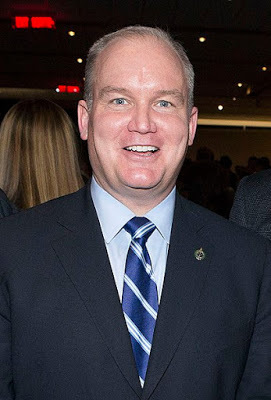 The plucky challenger.
The plucky challenger.'Od's Blog: Catholic comments on the passing parade.
Published on August 23, 2020 07:52
August 22, 2020
I'm a Leftist
Just for interest's sake, I once again recently took the "Political Compass" test online.
While I doubt the validity of some questions, it puts me just about where, on the political spectrum, I would put myself: moderately left-libertarian.
Of course, in the current insane political climate, I would probably be accused of being right-wing and authoritarian. But that is because what is currently called "left" is simply and accurately "insanity."
Your Political CompassEconomic Left/Right: -1.88
Social Libertarian/Authoritarian: -2.67
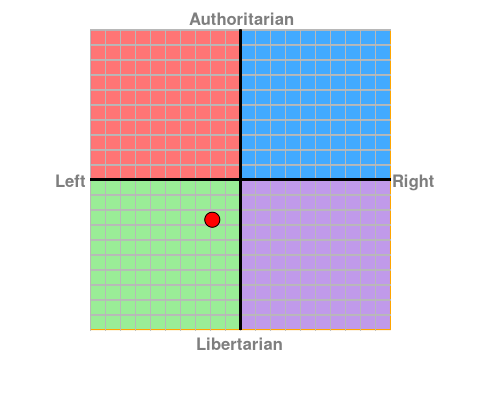 'Od's Blog: Catholic comments on the passing parade.
'Od's Blog: Catholic comments on the passing parade.
Published on August 22, 2020 06:20
I Feel Pretty
A student sent this clip; she is planning to use it with her own students in her English class.
It is the climax of the movie “I Feel Pretty” designed to hit the audience over the head with the uplifting moral.
Unfortunately, it is a bad moral. It illustrates how far we, as a society, or at least Hollywood, has strayed from the path of good sense.
“When we're little girls, we have all the confidence in the world. We let our bellies hang out, and... And we just dance and play and pick our wedgies.”
“And then these things happen that just... They make us question ourselves. Somebody says something mean to you on the playground, and then we grow up, and you doubt yourself over and over again until you lose all that confidence. All that self-esteem, all that faith you started with is gone.”
A fair description of the experience of most girls, no doubt. But, “things happen”? Denial. What things? What exactly happens between childhood and adulthood? It is not that somebody says something mean to you on the playground. It’s the coming of the age of reason, and the realization that you might actually have done something immoral, as opposed to someone simply being mean for pointing it out. And it is the coming of puberty.
Girls are spoiled in childhood. Increasingly, with the “self-esteem” movement, all children probably are. They are told they are wonderful, no matter what they do, and nothing is expected of them.
To anyone who has been spoiled, coming to the age of reason, and puberty and sexual awakening, must be difficult. Now it is not possible to do whatever you want and still be good and wonderful. Even if you have no sexual morality, and see no issue with aborting unwanted children, you still suddenly have the need to attract members of the opposite sex to satisfy your desires. You must please others.
A spoiled child has no idea how to do so.
Moreover, she has no concept of morality. People who do not give her what she wants must only be being “mean.”
At this point, if she persists in the narcissism to which she has been trained, all other people are now her enemies. She is wonderful, and they are failing to acknowledge it. They need to smarten up.
This film advocates narcissism.
“What if when someone tells us that we aren't good or thin or pretty enough, we have strength and the wisdom to say what I am is better than all of that? Because what I am is me!”
Denial causes her to bury the issue—being good—but this is the real problem. The only way out is to discover morality. Her concern over being “pretty” is a matter of self-delusion, to avoid the real issue.
This is why so many young women are obsessive over being thin. It is not to attract men. Men often prefer women who are curvaceous, “zoftig.” Look at classical painting, or Playboy centrefolds. The obsession with being thin, sometimes to the point of anorexia or even suicide by starvation, is to reverse puberty, to get rid of those suggestive curves, in order to return to childhood, before one had discovered guilt.
Chasing after male attention and more sex is only going to make the underlying sense of guilt worse, and sharpen your hatred of the world and of men in particular.
The real problem here is raising girls, and children, with too much self-esteem, and no moral instruction. It is soul-destroying.
'Od's Blog: Catholic comments on the passing parade.
Published on August 22, 2020 05:59
August 21, 2020
The Final Lap
They are of course hedging their bets, but it looks from this news story as though the EU is betting on England's Oxford group being first out with an effective vaccine.
Meantime, Saudi Arabia and the UAE are putting in for early supplies of the Russian Sputnik V. This feels less significant. Given their cash reserves and small population, a bad bet it less risky for them.
'Od's Blog: Catholic comments on the passing parade.
Published on August 21, 2020 14:07
On Turning the Other Cheek
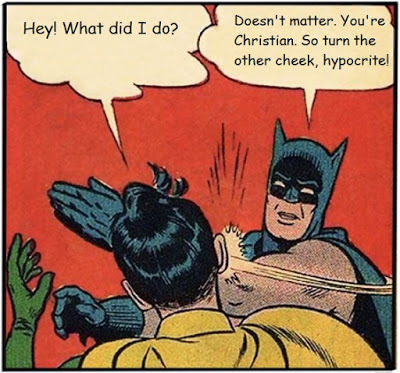
The second Biblical quote commonly used like a dagger by non-Christians against Christians is “turn the other cheek.”
“You have heard that it was said, ‘An eye for an eye, and a tooth for a tooth.’ But I tell you, don’t resist him who is evil; but whoever strikes you on your right cheek, turn to him the other also. If anyone sues you to take away your coat, let him have your cloak also. Whoever compels you to go one mile, go with him two. Give to him who asks you, and don’t turn away him who desires to borrow from you.”
This seems unambiguous.
Yet here again, Jesus apparently does not follow his own commandment. Luke 22:35:
“He said to them, ‘When I sent you out without purse, and wallet, and shoes, did you lack anything?’ They said, ‘Nothing.’ Then he said to them, ‘But now, whoever has a purse, let him take it, and likewise a wallet. Whoever has none, let him sell his cloak, and buy a sword.’”
This is clearly preparing for resistance.
The passages are perhaps reconciled by the fact that striking a social inferior on the cheek was apparently a standard way at the time of asserting dominance; the demand for one’s coat is described as the result of a lawsuit, with the authority of the court behind it; and compelling someone to carry freight for a mile was a privilege held by the Roman soldiery over the local population.
In other words, these all seem to refer to situations in which the persecutor has the backing of social authority.
In such a situation, open physical resistance seems likely to lead to dire consequences for the victim. Resorting to shaming instead seems wise advice for purely strategic, not necessarily moral, reasons.
Nevertheless, there is a moral argument to be made as well. Even if the social authority is evil, or allowing evil, upsetting social authority leads to chaos, and allowing evil a genuinely free rein. It would mean everyone going about doing whatever they want. Accordingly, civil disobedience is a grave act requiring special justification.
When the apostles return having managed to purchase only two swords, Jesus declares that this is enough. Then, as Jesus is seized by the authorities in the Garden of Gethsemane, Peter cuts off a soldier’s ear. Jesus tells him to stand down.
This seems to confirm the interpretation suggested: so long as the assault is individual, one has the right to resist with violence. If it involves the use of more than a couple of swords, it probably has social repercussions that outweigh the injustice to the individual victim.
In sum, Martin Luther King Jr. or Mahatma Gandhi, or Daniel O’Connell, had the commandment right: not that one is accept evil in silence and obedience, but that one should not oppose the social power, if evil, with violence. The wisest and best course is to attempt to shame them.
It is perhaps also worth noticing that this requirement to turn the other cheek is one of a list of commandments that seem hyperbolic. If you look at a woman with lust, you have committed adultery; if you call someone stupid, you have murdered them; if you make a solemn promise, you have lied.
The string ends with the phrase:
… Therefore you shall be perfect, just as your Father in heaven is perfect.
In other words, if you keep these commandments, you are godlike, perfect.
It is necessarily impossible for any of us to be perfect. It is gravely blasphemous to suppose so. The point of the list, then, is to cite legitimate moral goods that are beyond the human capacity to achieve. The point is not to feel self-justified.
'Od's Blog: Catholic comments on the passing parade.
Published on August 21, 2020 10:36
August 20, 2020
On Making Moral Judgments
 Salome and the head of John the Baptist.
Salome and the head of John the Baptist.“The devil can cite Scripture for his purpose.
An evil soul producing holy witness
Is like a villain with a smiling cheek,
A goodly apple rotten at the heart.
O, what a goodly outside falsehood hath!”
The quote from Shakespeare’s Merchant of Venice, has given us the common saying, “even the Devil can cite scripture for his purpose.” It is profoundly true—the Pharisees quote scripture against Jesus in the Bible itself. Every bad person has a few handy Biblical quotes they can use to bludgeon good people.
Chief among them are “turn the other cheek,” and “judge not, lest ye be judged.” They are useful for telling good people to shut up and let bad people go about their business.
But they only work their diabolical magic if taken out of context.
“Judge not, lest ye be judged.” If this is a commandment not to judge others, Jesus himself clearly and regularly breaks it. He accuses the scribes and Pharisees of sinfulness repeatedly. At the end of time, he will come again and judge everyone, the living and the dead.
Ah, you might say, but that is for God alone. God knows; we ought not to so presume.
Very well; consider then John the Baptist. He similarly loudly condemns the sinfulness of the Sadducees and Pharisees, and does so in Jesus’s presence.
“But when John saw many of the Pharisees and Sadducees coming to his place of baptism, he said to them, ‘You brood of vipers, who warned you to flee from the coming wrath?’” (Matthew 3)
He is beheaded for persistently accusing Herod and Herodias of sin.
Rather than condemn him for this behaviour, Jesus declares him the greatest of men.
“Most certainly I tell you, among those who are born of women there has not arisen anyone greater than John the Baptist” (Matthew 11:11).
In this, the Baptist was simply fulfilling the standard role of the prophets: calling out the people and the government for sins. Deny the legitimacy of doing so, and you deny the legitimacy of half the Bible.
On assuming the throne, Solomon prayed:
“Give your servant … an understanding heart to judge your people, that I may discern between good and evil.”
And God responded:
“Because you have asked this thing, and have not asked for yourself long life, nor have you asked for riches for yourself, nor have you asked for the life of your enemies, but have asked for yourself understanding to discern justice; behold, I have done according to your word. Behold, I have given you a wise and understanding heart; so that there has been no one like you before you, and after you none will arise like you. I have also given you that which you have not asked, both riches and honor, so that there will not be any among the kings like you for all your days. If you will walk in my ways, to keep my statutes and my commandments, as your father David walked, then I will lengthen your days.”
It very much sounds as though God approved of his choice. He wants us to exercise judgement, and to judge right and wrong. It is what we are here for; it is why we are given free will.
Now let’s look again at the original quote, in its full context:
“Don’t judge, so that you won’t be judged. For with whatever judgment you judge, you will be judged; and with whatever measure you measure, it will be measured to you. Why do you see the speck that is in your brother’s eye, but don’t consider the beam that is in your own eye? Or how will you tell your brother, ‘Let me remove the speck from your eye,’ and behold, the beam is in your own eye? You hypocrite! First remove the beam out of your own eye, and then you can see clearly to remove the speck out of your brother’s eye.” (Matthew 7; WEB)
It ends with Jesus recommending that you judge. And that to do so is a kindness, like removing a speck from your brother’s eye.
Sin is a spiritual illness, that if untreated leads to spiritual death. In plain terms, you go to hell. You morally owe it to another to point out their sin. It would be callous or insane not to.
The warning is specifically against hypocrisy, against judging others by a harsher standard than yourself.
This is indeed a common failing. Bad people think they can absolve themselves of sins by accusing others of them.
For example, look no further than the present Democratic convention. Bill Clinton a couple of nights ago accused Donald Trump specifically of not behaving with the proper decorum in the Oval Office. Clinton had sex with interns in that office. Last night, Obama launched an attack on Trump with “I did expect Donald Trump to show some interest in taking the job seriously … for close to four years now, he has shown no interest in putting in the work."
This is probably the most common accusation against Obama: that he did not seem to take the job seriously, seemed disengaged.
"Donald Trump hasn't grown into the job," Obama continued.
This sounds ironic from a younger man of an older man.
Finally, making the pitch for Biden and Harris over Trump and Pence, he opines “They understand that political opponents aren't unAmerican just because they disagree with you.” He actually blames the right for identity politics and “cancel culture.”
Of course, it is also always the sort who tells others to “judge not” who are first to hurl such accusations, as likely as not unfounded.
'Od's Blog: Catholic comments on the passing parade.
Published on August 20, 2020 16:04
August 19, 2020
A Voice Crying in the Wilderness; A Voice Crying in a Crowded Theatre
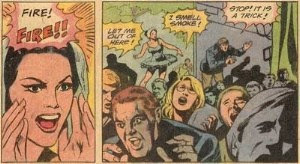
The film previews are finished, and the movie theater is quiet as everyone waits for the feature film to appear. However, the stillness is suddenly broken by a noise. The audience hears a sniffle. The sniffle soon turns to a cry, then a wail. There is an uncomfortable, or perhaps unhappy, toddler sitting in the movie theater. People start shuffling uncomfortably in their seats as they wait for what will happen next. Will the child be taken out of the theater, or will the parent pretend that everything is ok? Scenarios like these happen regularly. Bystanders wonder what the parent or caretaker will do. The action, of course, often depends on the parenting styles that adults use with their children. The two extremes are the lenient (laissez-faire) parent and the disciplinarian parent. Lenient parents often focus on their child's having fun and enjoying "being a kid.” If a child does something careless like break a glass, lenient parents will not become angry or scream. They know that the child is probably experimenting and meant no harm. Likewise, they may even explain to the child that it was an accident and the child should not be upset or cry. In addition, lenient parents may not be too concerned about time-based activities and schedules. They will allow their children to stay up late and experience new things. The motto "You're only a kid once!" ring true to these free spirits. This type of parent sees themselves as guides for their children, which cannot be said about the second parenting group: the disciplinarians. Disciplinarian parents consider themselves role models for their children. Unlike laissez-faire parents, their main priorities are safety and protection of their children! In essence, children are monitored very carefully and may not be allowed to play outside, interact with animals, or rough-house in general. A child who experiences this upbringing may be encouraged to focus on his studies instead of making friends. In addition, interaction may be limited to only close family members. Children who are raised in highly-disciplined environments are likely to do very well in school.
In the end, no parents are truly 100 percent lenient or 100 percent strict when it comes to raising their child. Most fall somewhere in the middle depending on the child, the environment, and the particular situation. Society knows that both child-rearing styles have advantages and disadvantages, but the more interesting question is this: Which style will these children choose when the time comes for them to become parents?
The passage appears as a model essay in a current composition textbook. It illustrates the problem in our culture. It deals with childrearing with no mention of the issue of teaching morality.
Consider the opening scenario: a child is wailing in the theatre. Apparently, whether the parents silence the child, or let them wail, is here merely a matter of their “parenting style.” No acknowledgement that wailing, or allowing a child to wail, in a crowded theatre is a violation of the rights of others.
Again, the second example, of a child breaking a glass: the essayist represents all such incidents as equal. There is no moral distinction made between genuine carelessness and mere childish clumsiness. The only distinction is “parenting style.” It is okay, then, to blame children for things over which they have no control—the very definition of moral abuse.
In discussing “disciplinarian” parents, there is no acknowledgement that the purpose of discipline is to develop moral behavior. Instead, the only possible aim is “safety and protection.” No doubt that was what Hector and Lysander were striving for.
Given the literal meaning of “discipline,” “The practice of training people to obey rules or a code of behavior” (Oxford), this looks like deliberate suppression of the idea of ethics or morality.
In our textbooks. In our schools. Taught to our children.
'Od's Blog: Catholic comments on the passing parade.
Published on August 19, 2020 14:46
August 18, 2020
A Torrent of Good News
... on COVID-19.
'Od's Blog: Catholic comments on the passing parade.
Published on August 18, 2020 16:04
Apocalypse Now?
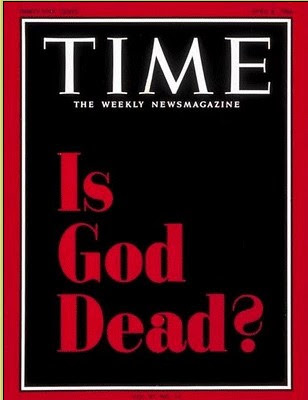
The mysterious case of hydroxychloroquine seems to illustrate a grave problem in our current world. It may or may not work to cure COVID-19. But how is it that we still do not know? First reports of it being effective are almost as old as first reports of the virus. How is it that, six months in, nobody has conducted a proper trial? While prominent authorities, without good evidence, keep declaring that it does not work, or is dangerous.
And there have been no proper trials despite the outlay of huge amounts of public funds to try all possibilities.
There seem to be two problems here: first, that Trump was an early advocate, so that if it works, it makes him look good. That is intolerable to the professional class in general. Second, that the drugs used for the hydroxychloroquine treatment are out of patent and readily available, so that nobody can make much profit if they work. Moreover, if they work, they remove the opportunity of making large profits on some other drug.
Why would this affect even public funding? Milton Friedman long ago explained. Governments must rely on those with expertise to regulate professions and industries. That means industries regulate industries, and professions regulate professions. Public money gets allocated as advised by the big drug companies.
We evidently cannot rely on either public-spiritedness or morality. Those in charge are letting vast numbers of people die rather than prejudice their own interests. Power may or may not corrupt; but the people in power now are corrupt.
Just as something has to be going on with hydroxychloroquine, something has to be going on with Jeffrey Epstein, his island empire and his death; and with the fact that we have heard so little since about it. Something has to be going on with the Durham probe, the apparent attempt to subvert the government through false claims of Russian collusion; and the fact that we have heard so little since about it. Something was going on with Cardinal Archbishop McCarrick, and the resistance in the Vatican to looking any further into it. These are not conspiracy theories; these are proven conspiracies. Nor is this just a problem with the US civil service, the “Deep State.” The Vatican is not part of that. Nor is this a problem with “capitalism.” Professions and unions are at least as corrupt as businesses, it seems, and government as corrupt as private funding. Nor is this corruption just at the top; the same rot is seen as mobs burning and looting in America’s streets. There is the same lack of any sense of responsibility to one’s neighbours or one’s polis. Everyone grabs what they can get.
Probably all of us have seen, too, in our own jobs and our professions, how pervasive corruption has become. Journalism is perhaps the most visible example, operating as it does in the public eye. Nowadays the news itself is grossly biased, often fake, little more than clickbait, published in utter disregard of stated journalistic ethics. TV anchors say things on air they must know are untrue.
Was the world ever thus? Is it just that, with better communication, it is more visible?
Perhaps in part. But major outlets like the Economist, the Globe and Mail, the New York Times, really did hold themselves to real standards even a few years ago. There was a distinction between news and editorial pieces. Facts were checked, and both sides quoted. Headlines resembled what was in the story. I am not imagining this; I have done such fact-checking professionally myself. You can go back and read past issues in various places online.
Comparable decay seems evident everywhere. It is as apparent in the arts. The high-tech sector used to be a moral place, leaving aside Microsoft, and Google used to use the motto “do no evil.” Now all the tech giants are deeply political, and seem to be alarmingly interested in power. I am equally aware of the rapid decay in academics, another long-term home. Marks are no longer awarded for merit; academic subjects are often content-free, or the content is completely different from what the fields advertise it to be. Nobody seems to be in it for the sake of human knowledge or pursuit of truth. Only out of self-interest and class interest.
And it is not at all hard to understand why. Postmodernism; it began in the academies. Unfortunately, all other fields have, over time, channeled their initiates through the academies. It was a perfect environment for the virus to spread. It all began 140 years ago, with Nietzsche declaring God was dead. This was picked up quickly enough by intellectuals, and his influence has only grown since.
Have you not heard of that madman who lit a lantern in the bright morning hours, ran to the market place, and cried incessantly: "I seek God! I seek God!"---As many of those who did not believe in God were standing around just then, he provoked much laughter. Has he got lost? asked one. Did he lose his way like a child? asked another. Or is he hiding? Is he afraid of us? Has he gone on a voyage? emigrated?---Thus they yelled and laughed.
The madman jumped into their midst and pierced them with his stare. "Where is God?" he cried; "I will tell you. We have killed him---you and I. … Do we smell nothing as yet of the divine decomposition? Gods, too, decompose. God is dead. God remains dead. And we have killed him.
...
Here the madman fell silent and looked again at his listeners; and they, too, were silent and stared at him in astonishment. At last he threw his lantern on the ground, and it broke into pieces and went out. "I have come too early," he said then; "my time is not yet. This tremendous event is still on its way, still wandering; it has not yet reached the ears of men. …. This deed is still more distant from them than most distant stars---and yet they have done it themselves.Nietszche advises,
It has been related further that on the same day the madman forced his way into several churches and there struck up his requiem aeternam deo. Led out and called to account, he is said always to have replied nothing but: "What after all are these churches now if they are not the tombs and sepulchers of God?"
When one gives up the Christian faith, one pulls the right to Christian morality out from under one's feet. This morality is by no means self-evident… Christianity is a system, a whole view of things thought out together. By breaking one main concept out of it, the faith in God, one breaks the whole.The intellectuals, the scribes and Pharisees, pulled the plug seven generations ago. Seven generations to move through the grad schools, then the colleges, then the public schools. All else follows. Beginning with Fascism, a kind of vanguard movement.
Yeats saw it in 1937:
Turning and turning in the widening gyreOur civilization is in moral decline. This is how cultures and civilizations end. Ibn Khaldun mapped it all 600 years ago. Lack of morality is like rust in the gears of everything, that will sooner or later bring it all to a crashing halt. Perhaps we are finally seeing it happen now.
The falcon cannot hear the falconer;
Things fall apart; the centre cannot hold;
Mere anarchy is loosed upon the world,
The blood-dimmed tide is loosed, and everywhere
The ceremony of innocence is drowned;
The best lack all conviction, while the worst
Are full of passionate intensity.
…
And what rough beast, its hour come round at last,
Slouches towards Bethlehem to be born?
And now the wheels of heaven stopWith no God, at least no God we took seriously, we stopped teaching morality to the young. We stopped caring about the young. We started killing the young. We progressed, a progressive lot, to declaring that morality did not exist, it was only something we agreed upon among ourselves in small groups. Love became to us only sexual gratification. Then we moved to declaring all morality oppressive, and grew hostile to any hint of right or wrong. Things were simply “appropriate.”
You feel the devil's riding crop
Get ready for the future: It is murder.
Next, we rape and eat one another.
Is it over? I hold some hope for salvation from the East: Christianity, and so Judeo-Christian ethics, is actually growing worldwide, especially in East Asia and in Africa. This could include China, the moment its present government fell and the floodgates were opened. Here there is vitality and optimism, and perhaps social cohesion. Christianity has also been reviving in Eastern Europe.
And there is another possibility.
Apparently, forty years ago, an odd American, deeply devout, living near Rome, had a mad vision, a vision at least as mad as that of Nietzsche’s madman. I take no responsibility for it; I merely report. He believed that a man had already been born who had been chosen by Providence to lead his homeland, the United States, back to God. It was an improbable choice; but then, God’s choices are always improbable. Moses was a stuttering murderer, David was a mere shepherd, a murderer and adulterer. Jesus was an ordinary carpenter, and Peter an uneducated fisherman. Augustine was a narcissist and, he says, a sex addict. Saul aggressively persecuted Christians.
The man he thought he had been told of? A celebrity playboy. A man named Donald Trump.
'Od's Blog: Catholic comments on the passing parade.
Published on August 18, 2020 14:26
Trump Derangement Syndrome
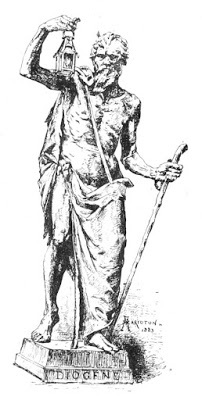 Diogenes looking for an honest man.
Diogenes looking for an honest man.What causes Trump Derangement Syndrome? The left declares every Republican candidate for the presidency to be worse than Hitler as a matter of course; but something more is going on with Trump, something that really looks like a mental illness—a disconnect from reality.
Some even say that Trump is able to, or should, use this to further his aims. If he declares himself in support of something, he can count on the left to oppose it. If he is for peace, they are for war. If he is for ending illegal immigration, they are for ending all border controls. He could put an end to all his opposition at a stroke, by saying he was against jumping off cliffs.
It is not as if Trump’s policies and positions are ideologically extreme. They are a mixed bag, mostly moderate. Ideological disagreement cannot account for this reaction.
What is maddening about Trump, what is past all bearing, is that he tells the truth.
The telltale proof is that the most common complaint against him is that he lies.
Trump does not lie. He exaggerates for effect. A lie requires intent to mislead.
Those who support him often support him because he regularly says plainly what he thinks: his unfiltered Tweeting, his bluntness, and his refusal to pay any heed to the demands of “political correctness.” We always know where he stands. That, and, increasingly, his honesty in genuinely attempting to fulfill his campaign promises.
Nothing is more alarming to a liar than a man who insists on telling the truth. They beheaded John the Baptist for it. They crucified Jesus for it. They persecuted all the prophets for it.
This is the verdict: Light has come into the world, but people loved darkness instead of light because their deeds were evil. Everyone who does evil hates the light, and will not come into the light for fear that their deeds will be exposed.
A lot of people have done a lot of evil.
'Od's Blog: Catholic comments on the passing parade.
Published on August 18, 2020 12:24



